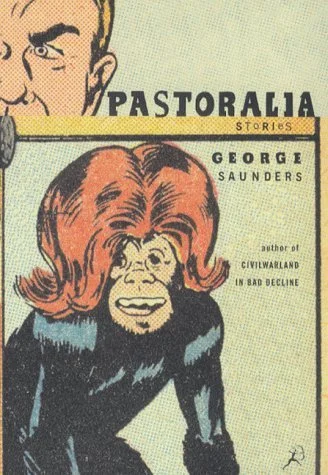
Review of George Saunders Pastoralia
The best way to explain my feelings about this short story would be that George Saunders delivered in the greatest way possible. Saunders use of symbolism and humor left me introspectively laughing. The story closely resembles work life politics, and the overall mundane many workers may face. Through Saunders use of perspective, it left me feeling like in the end we shouldn’t be married to our jobs. That we should yearn for better and under unfortunate circumstances, we are only compelled to do the right thing for ourselves.
Pastoralia’s navigates you through the life of the un-named narrator who is a professional caveman employed and living at a theme park. The narrator is accompanied with his subpar coworker Janet as his caveman wife. The narrator is challenged by higher ups in the company to convey honest performance reviews of Janet that the narrator has been less than honest about. This ends up building up conflict between the narrator and his bosses as he struggles to do right by Janet. Pastoralia’s does a great job of satirizing the underbelly of corporate employment with strong central themes of class struggle, late-stage capitalism and the power of choice and its circumstances.
This piece is highly relatable to any employed person who has felt a little lost in their job. It imparts feelings of inadequacy or uncertainty in the proverbial grind we face every day in the workforce. This short story brings me back, through its silly and whimsical dialogue, to saying “oh yeah, its not that serious, what am I fretting on about.” The story’s dialogue and setting matched on par with aesthetics reminding me of Charlie Kaufman’s absurd humor mixed with Terry Gilliam’s dystopic film Brazil. A term being thrown around within the last few years is “boring dystopia” which involves subdued versions of dystopic themes. Pastoralia’s, I think perfectly, exhibit the theme of boring dystopia as you deal with the protagonist bosses showcasing their lack of empathy through a use of Laissez Faire dialogue symbolizing what modern day capitalism looks like.
Saunders also ingeniously employs the use of repetition throughout the story with most chapters leaving off with the protagonist having given good performance reviews for his older partner Janet. I believe that this is important for the story as it shows the monotony of day-to-day work life. Themes of class struggle are shown with how the narrator interacts with the higher ups in the company. At one point the protagonist is being lectured by one of his bosses, Marty, and then later you find out Marty also has financial struggles at home as well as struggles of being in middle management. Marty vouches for the company until his termination of employment and Marty’s tune begins to change. Marty finds himself angry and fears his son’s future of going back to public school where he’ll be bullied by the other students.
Saunders brilliantly conveys elements of dark humor such as the bosses faxing to the companies’ workers on why they should have to pay to dispose of their excrement. The bosses then go on to compare that it’s the same as buying a coke. Just small things like this draw out the comedy to the absurd living situations that the company’s workers live in. The Boston Review shares a similar opinion by comparing Saunders to the late and great comedian Richard Pryor as being the new title holder of the funniest man in America. I would highly recommend this piece for anyone looking for a good laugh and maybe a good cry.